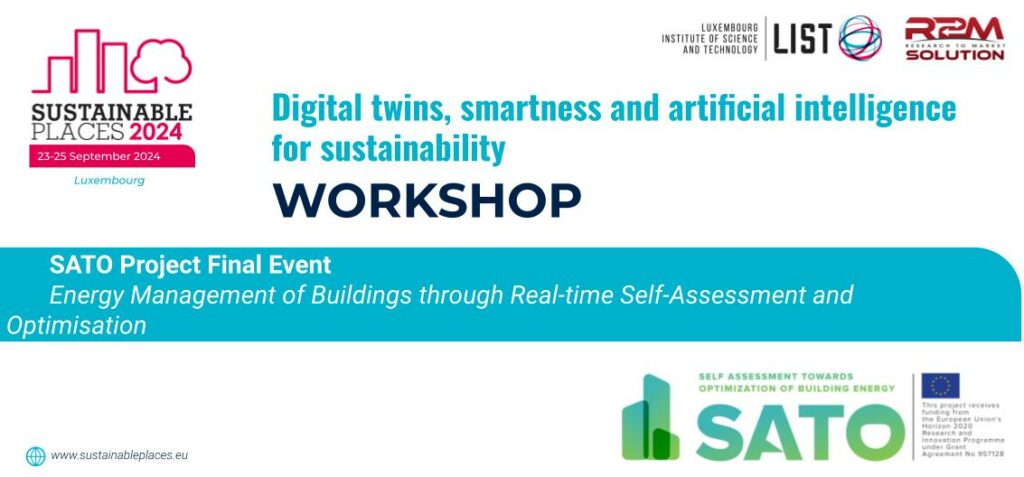Energy Management of Buildings through Real-time Self-Assessment
Wednesday 25 September 2024 | 11:00-12:30 | Briefing Room CZ | Workshop | Hybrid

“Energy Management of Buildings through Real-time Self-Assessment and – Optimization: SATO project final event”
Existing data on building energy use paint a bleak image: real-life energy consumption often exceeds design predictions by more than 100%. As a result, reducing the gap between designed and real energy use has become central in current efforts to increase building energy efficiency. The ongoing digital transition brings the possibility of real-time energy resource management to building owners/managers. To better tap into this potential, stakeholders must be able to continuously assess the energy performance of building energy systems and appliances, identifying areas where optimizations can be performed. Implementing this assessment capability requires real-time monitoring and control of the building equipment and major energy-consuming appliances. This functionality can be effectively performed by Internet of Things (IoT) enabled sensors and devices that communicate with the cloud and execute control actions (thereby becoming smart devices). Although modern smart devices and systems allow for remote monitoring and control, most systems cannot assess their energy performance. This fault is even more prevalent in legacy equipment and appliances. Therefore, upgrading buildings, appliances, and technical building equipment with energy assessment capabilities is still a daunting challenge that must be met to reduce the energy consumption of buildings and their equipment.
SATO is an H2020-funded project to advance real-life assessment of energy performance and consumption in buildings by developing a platform, the SATO platform, for autonomous self-assessment and optimization of buildings’ energy resources. The SATO platform consists of an IoT middleware, a self-assessment framework, a framework of optimization services, and end-user applications and interfaces.
Based on implementation in two SATO project office pilot buildings in Denmark and Portugal, respectively, the workshop presents the potential impact of building self-assessment, -optimization, and control on real-time energy resource management and system fault detection. The workshop also presents how BIM integration and presentation of self-assessment results and outcomes can provide support to building management for interpretation and overview of building performance as well as decision-making related to maintenance and system upgrades.
Despite the benefits, buildings do not automatically assess their own performance and provide recommendations for building maintenance and upgrades. What are the main reasons for the building sector lagging behind other sectors like energy and industry? What are the main barriers for such development to happen in the building sector?
(The listed attendees will be attending physically)
Contributing projects:
Session Chair:
Per Heiselberg, Aalborg University – Simon Pommerencke Melgaard, Aalborg University – Pablo Gilabert, CYPE – Frederico C. Melo, University of Lisbon – Nuno R. Martins, University of Lisbon – Brian Thomsen, Frederikshavn Boligforening
Workshop Chair: Per Heiselberg, Aalborg University
